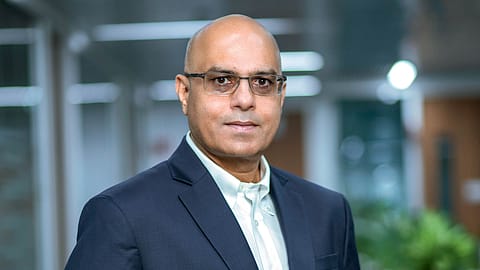Pivoting ABB India
Sanjeev Sharma changes focus to fast moving industrial goods to put company on a growth highway.

This story belongs to the Fortune India Magazine October 2024 issue.
IN JANUARY 2022, Pune’s JW Marriott achieved a milestone by installing an innovative solution in the heating ventilation and air conditioning (HVAC) system to lower energy consumption by 35%. HVAC systems account for around 50% energy consumption in buildings. To put things in perspective, the energy saved in a day by JW Marriott can power an electric car for about 1,500 kms. Next month, in Chittorgarh, Rajasthan, about 900 kms from Pune, Wonder Cement installed a solution to save up to 15% energy annually; the savings can power over 9,000 households per month.
These two businesses are diverse but share a common thread — the systems were installed by ABB India, the Indian arm of the global electrification and automation leader focused on sustainable future. ABB India has been manufacturing its products in the country for the last 74 years, operating predominantly in electrification, energy efficiency, process automation, robotics and discrete automation, which are firing on all cylinders, propelled by an upswing in the economy and government focus on infrastructure and energy transition. In CY23, gross sales were ₹10,367 crore, a three-year CAGR of 21.2%. Profit after tax was ₹1,242 crore, with a three-year CAGR of 78.3%. ROCE was 30.4%.
New Strategy
Portfolio restructuring and customer connect in a high-growth country like India have kept the company ahead of the curve, says ABB India Country Head and MD Sanjeev Sharma. One of the biggest decisions over the last few years has been divesting the power grids business to Hitachi and the solar inverter business to FIMER SpA. “ABB wanted to focus more on industry, infrastructure and automation globally,” says Sharma. “Electrification, energy efficiency, manufacturing and process automation were the themes around which we built our portfolio. Our portfolio became more fast moving industrial goods where we could deliver and convert deliveries into cash quickly,” says Sharma. This was part of ABB’s global transformation into a product powerhouse catering to several sectors and industrial retail. The company’s market capitalisation has grown from $3.5 billion in 2019 to $21 billion in May 2024.
The Expansion
In the past decade, India’s macroeconomic strength, coupled with significant traction in areas such as data centres, metro train projects, electronics and water projects have broad-based the revenue profile of the company. “Eight-ten years back, we used to be exposed to six-eight market segments. Today, the number is 23,” says Sharma, adding, “data centres are a sweet spot for ABB as they require a lot of power.” There is also a huge emphasis on the water segment, he says. “Pharmaceuticals and electronics manufacturing have become new-age segments,” he adds.
The massive capital expenditure by the Central government is also working in favour. Union government has budgeted ₹11.11 lakh crore for capital expenditure this year. Almost half, ₹5.3 lakh crore, has been allocated to highway and railway. “It is a game changer for whoever is participating in that segment. Trains in Europe run on ABB technology. As India gets sophisticated engines and train sets, we will be a direct beneficiary,” he says. ABB India sees metro proliferation as an opportunity and expects a lot of expansion in metals and mining.
More Stories from this Issue
Sharma says it is challenging to participate in a large and expanding consumer market like India without manufacturing domestically. “More and more people are setting up base here to capture growth in India. You can call it China-plus. It is about diversification, capturing the local requirement and creating an alternative base to serve global markets,” says Sharma. As someone who has watched China closely, he believes China will also continue to perform well on its own. That said, Sharma, an avid sports lover, is equally bullish on growth prospects that India is set to offer.